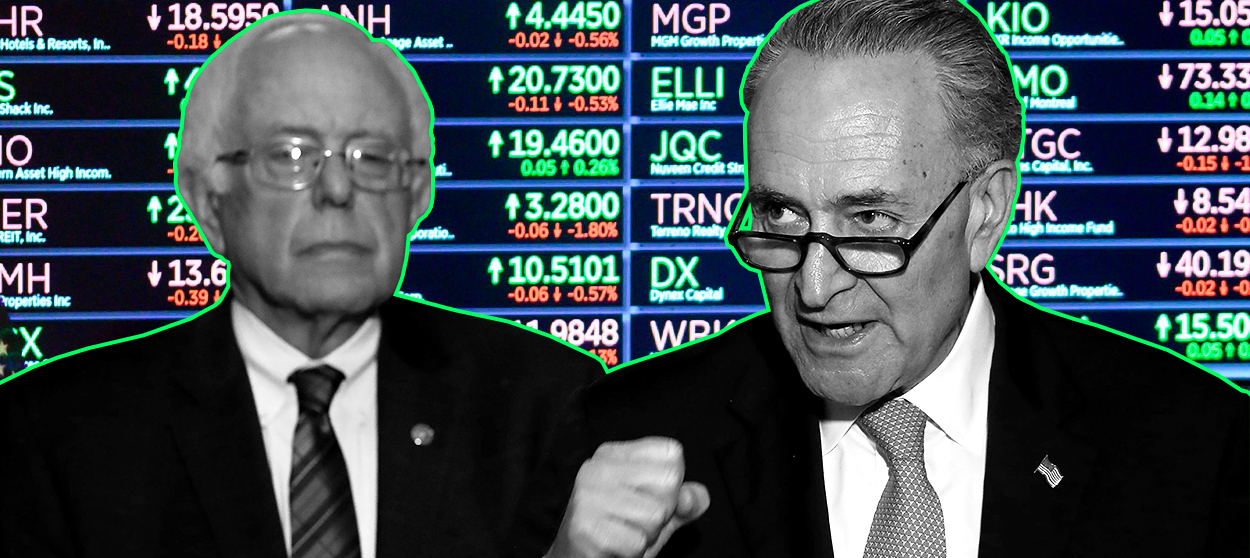Just ban stock buybacks again
Prior to 1982, stock buybacks were almost unheard of — and the economy did just fine


A free daily email with the biggest news stories of the day – and the best features from TheWeek.com
You are now subscribed
Your newsletter sign-up was successful
Senate Minority Leader Chuck Schumer (D-N.Y.) and Sen. Bernie Sanders (I-Vt.) want to clamp down on stock buybacks. This practice, worth a record $1.1 trillion in 2018, is when publicly traded companies buy their own shares from Wall Street traders. Schumer and Sanders are certainly right that this is a huge problem. But their solution — tightening rules for when companies can do it — isn't enough.
The best fix is to just prohibit stock buybacks, period.
The basic pro-buyback argument is they make capitalism more efficient: Money going into buybacks is money that companies "don't need," so returning it to Wall Street allows traders to pump it into other, more productive endeavors.
The Week
Escape your echo chamber. Get the facts behind the news, plus analysis from multiple perspectives.

Sign up for The Week's Free Newsletters
From our morning news briefing to a weekly Good News Newsletter, get the best of The Week delivered directly to your inbox.
From our morning news briefing to a weekly Good News Newsletter, get the best of The Week delivered directly to your inbox.
There are multiple problems with this story.
The biggest is that prior to 1982, stock buybacks were almost unheard of — and the economy did just fine. Mid-century America had an abundance of jobs, rapidly rising wages, and higher productivity rates. It was also a time when stock buybacks basically never happened. The Securities and Exchange Commission (SEC) considered them a form of stock market manipulation and regulated them accordingly. Then in 1982, the SEC issued rule 10b-18 — colloquially known as the "safe harbor" rule — permitting stock buybacks as long as certain daily limits were followed.
In practice, this was a blank check. "Apple, for example, could buy back $1.4 billion worth of its stock in a single day without exceeding [the rule]," as economist William Lazonick and journalist Ken Jacobson noted last year.
If you look at total corporate payouts to shareholders — buybacks plus more traditional dividends — they've exploded from toughly 3 percent of GDP in 1980 to around 8 percent today. Over that same time period, overall productivity growth in the economy slowed down precipitously. Wages stagnated, overall unemployment rates rose, and businesses investment collapsed. Obviously stock buybacks aren't alone to blame for all these issues — but they certainly didn't usher in an economic golden age either.
A free daily email with the biggest news stories of the day – and the best features from TheWeek.com
Meanwhile, companies could be reinvesting the profits funding buybacks into their own workforce. As Schumer and Sanders write, "Our bill will prohibit a corporation from buying back its own stock unless it invests in workers and communities first, including things like paying all workers at least $15 an hour, providing seven days of paid sick leave, and offering decent pensions and more reliable health benefits."
Now while the spirit of the senators' idea — making companies reinvest in their workers instead of juicing their stock prices — is appealing, there are two practical problems with the proposal.
The first is practical: This solution would drastically increase the regulatory burden on the SEC. A blanket prohibition on stock buybacks is easy to enforce. Poking through each company's business plan and balance sheet to see if they've qualified for buybacks is way more complicated, subjective, and time-consuming. "Does anyone really believe the SEC will suddenly devote its scarce resources to determining whether companies are good corporate citizens to workers and communities?" David Dayen asked. In fact, the SEC doesn't even have the regulatory authority to collect the data it needs to police buybacks as it is.
The second problem is more theoretical. By allowing circumstances in which buybacks can still happen, Schumer and Sanders implicitly concede the argument that buybacks make the American economy function better. And there's no reason to buy that story at all.
Sen. Tammy Baldwin (D-Wisc.) has the right idea. In 2018, she proposed a bill that would ban stock buybacks outright — no ifs, ands, or buts about it. That's the approach Schumer and Sanders should take too.
Jeff Spross was the economics and business correspondent at TheWeek.com. He was previously a reporter at ThinkProgress.
-
 The ‘ravenous’ demand for Cornish minerals
The ‘ravenous’ demand for Cornish mineralsUnder the Radar Growing need for critical minerals to power tech has intensified ‘appetite’ for lithium, which could be a ‘huge boon’ for local economy
-
 Why are election experts taking Trump’s midterm threats seriously?
Why are election experts taking Trump’s midterm threats seriously?IN THE SPOTLIGHT As the president muses about polling place deployments and a centralized electoral system aimed at one-party control, lawmakers are taking this administration at its word
-
 ‘Restaurateurs have become millionaires’
‘Restaurateurs have become millionaires’Instant Opinion Opinion, comment and editorials of the day
